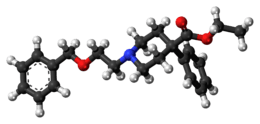Benzethidine
 | |
 | |
| Clinical data | |
|---|---|
| ATC code | none |
| Legal status | |
| Legal status |
|
| Identifiers | |
| |
| CAS Number | 3691-78-9 |
| PubChem (CID) | 62516 |
| DrugBank |
DB01518 |
| ChemSpider |
56290 |
| UNII |
X0I74BAR02 |
| ChEMBL | CHEMBL2104234 |
| Chemical and physical data | |
| Formula | C23H29NO3 |
| Molar mass | 367.481 g/mol |
| 3D model (Jmol) | Interactive image |
| |
| |
| (verify) | |
Benzethidine is a 4-phenylpiperidine derivative that is related to the opioid analgesic drug pethidine (meperidine, or Demerol).[1]
Benzethidine is not currently used in medicine and is a Class A/Schedule I drug which is controlled under UN drug conventions. It has similar effects to other opioid derivatives, such as analgesia, sedation, nausea and respiratory depression.[2] In the United States, the drug us a Schedule I Narcotic Controlled Substance with a DEA ACSCN of 9606 and 2014 annual aggregate manufacturing quota of nil.[3] The most common salt in use is the hydrochloride, free base conversion ratio of 0.910
References
- ↑ Maul C, Buschmann H, Sundermann B. Opioids: 3.3 Synthetic Opioids. Analgesics 2005; 159-169. ISBN 978-3-527-30403-5
- ↑ Cahal DA, Dare JG, Keith D. A Sequential Trial of Analgesics in Labour. International Journal of Obstetrics and Gynaecology 1961; 68(1): 88–93.
- ↑ http://deadiversion.usdoj.gov/quotas/conv_factor/index.html
This article is issued from Wikipedia - version of the 8/24/2016. The text is available under the Creative Commons Attribution/Share Alike but additional terms may apply for the media files.